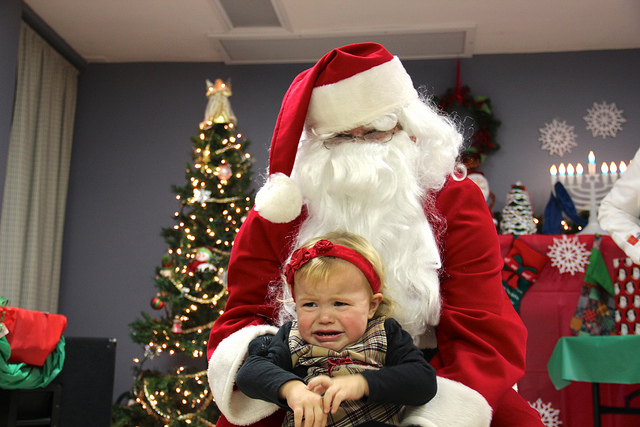
My friend’s son, Adam, was diagnosed with autism a few years ago.
And although I think my friend is an amazing, dedicated, and committed mom, even she finds the holidays to be a challenging time for her son.
For example, her son seemed very interested in receiving a bike last Christmas. She and her husband were thrilled and excited to be able to have a beautiful new Huffy bike waiting for him under the tree on Christmas morning. But when the big day finally arrived, she was taken aback by his reaction.
When he saw the bike, he became extremely overwhelmed. The bright color, the shiny, sparkly spokes on the wheels, and the big, bulky pedals were just a bit too much for Adam to comprehend. He ended up screaming and running back into his room.
That Christmas morning was a game-changer for my friend. And since then, she has learned that even the most perfect gift may need a little preparation first.
Crowded malls, bright decorations with flashing lights, blaring music, new social events, and the anticipation of Santa arriving soon can be extremely overwhelming for all children. But if you have a child with a disability, the holidays can be the most challenging time of the year. But the holiday season doesn’t have to be a stressful experience for your special needs family. By taking your child’s unique needs into account, you can make this a safe and enjoyable holiday to remember.
Here are a few ways that parents and caregivers can help keep the holidays happy for their kids with a disability:
Prepare them for the holidays.
Talk about plans, remind them of traditions that your family typically participates in, and most importantly, discuss expectations. Remember, the holidays can often interrupt their daily (or nightly routine).
And speaking of routines, make sure you don’t forget yours (or theirs). A child’s schedule usually provides structure, stability, and promotes calm. It’s easy for our schedules to become compromised during the holidays. School is out early, we tend to stay up later, visitors come over to visit, new foods and traditions are introduced, and there is more activity in general.
Practice relaxation techniques.
When stressful situations head your way, let your kids see you practice self-calming techniques. Encourage them to use these on a daily basis. Practice deep breathing together. Positive thinking and visualization are also powerful and easy tools they can learn from you. Remember, they are always watching you. Make sure you’re modeling the behavior you would like them to have.
Keep meals on track.
It’s easy to snack all day on high carb, high sugar, low nutritional value goodies because they suddenly appear within our reach everywhere. Be wary of adding excess sugar to your child’s diet. Stick to special diets for kids on the autism spectrum, (dairy-free, casein-free, gluten-free diets in some cases). Be prepared when taking your child with you into other people’s homes. Bring along your own healthier, low sugar snacks as alternatives.
Make sure your children are getting enough ZZZ’s.
We can’t perform at highly functioning levels if we’re tired, and this includes our children. Children have a tendency to get upset quicker if they’re not receiving enough sleep. Getting an adequate amount of sleep is essential in keeping their health on track and their moods more consistent.
Monitor your child for signs of anxiety and stress.
You know your child and their disability better than anyone, which is why it is so important to keep a close eye on them during this chaotic season. The earlier you spot any signs of stress, anxiety, or overwhelm, the quicker you can deal with it, and this can help keep your child safe. If you do identify signs of distress, take your child to a quieter place to help them calm down at their own pace. It’s also important to be sensitive to your child’s unique sensory issues. This way you can help them avoid situations that will be overstimulating. Monitoring your child will keep their anxiety under control and will present any sensory overwhelm from escalating. This will prevent meltdowns and could also decrease the likelihood of wandering.
If you’re visiting others, teach your child the names of the people your visiting ahead of time.
It’s even helpful to show pictures of the relatives and friends your child will be seeing. It’s often a good idea to ask whoever you’re visiting if you could designate a quiet place ahead of time in case your child starts to feel overwhelmed. Bring along an activity bag especially for them. Include things like coloring books, crayons, books, and puzzles to make your child feel at ease while in a large group.
Make your child feel prepared, empowered, and important.
Before it’s time to attend a holiday get together, practice with your child how to receive a gift, how to thank the giver and how to greet guests at the door. Give them a role at holiday gatherings. You can also help your child shine by asking him or her to assemble toys after a gift is opened, assist with handing out gifts to each guest, cooking something ahead of time (with your assistance), or perhaps taking pictures of the fun activities at the event.
Evaluate a holiday event venue beforehand.
Not all venues are suitable for a child with special needs. It’s important to carefully consider your child’s unique requirements. For example, if your child has sensory issues, a crowded park where a holiday celebration is going to be held may not be the best event to attend.
We live in a noisy world. And children with sensory issues often find loud noises (like fireworks, loud music, and bells ringing) upsetting. Consider quieter events as they may be more enjoyable to your child, like cooking, baking, reading holiday stories, or attending children’s holiday events at a library or local bookstore (some offer adorable holiday book reading parties). A low-key holiday movie at home with the family is also a great, yet peaceful, alternative. Making sure a venue is suitable for your child can help prevent meltdowns and will make it easier for both you and your child to relax and enjoy the holidays.
Be on guard for wandering.
This can be an unsafe time of year for a child with special needs. Whenever routines are altered, there’s a potential for kids to get separated. Wandering becomes a major concern, especially for children diagnosed with autism. Help your child choose brightly colored clothing on outing days. That way, they can be easily identified in a crowd. In addition, glow in the dark wristbands or an easily identifiable vest or hat can also be helpful if they will tolerate wearing it. Yellow or green colors work best.
Holiday proof your home.
From candles to Christmas trees, this festive season poses unique safety risks to all children, but even more so in the case of a child with special needs. It’s a good idea to thoroughly check your home for any potential safety risks a few days before the holidays start.
Things to watch out for include breakable glass ornaments, candles that could fall over and cause fire, and objects that could easily be tripped over. A friend of mind had her family all packed up in the car and ready to travel to grandma’s house for Christmas when her daughter with special needs said she needed to go back in and check on her new dollhouse and dolls before they left. She went back inside the house unsupervised and decided to light Christmas candles inside the dollhouse so the dolls wouldn’t be in the dark while she was away. They came back to a burnt structure they used to call their home.
Slow down.
We can easily feel overwhelmed at the holidays because we often have so much to do. Try slowing down instead of rushing around during this time of year. Rushing can cause anger and anxiety that will bubble up in children and teens alike. Make sure you leave enough time to enjoy the journey so you can avoid potential meltdowns. Children with special needs always need to be given notice of transitions from one thing to another. Slowing down helps transitions become more tolerable.
Children with mental health, developmental, or physical challenges such as autism, ADHD, sensory issues, depression, and anxiety often need extra help managing the festivities of the season. By using these tips, we can create a less stressful and happier holiday for everyone in our family, especially our children.
~
Author: Melinda Campbell-Weber
Image: daveynin/Flickr
Editor: Catherine Monkman
Copy Editor: Lieselle Davidson
Social Editor: Waylon Lewis







Read 2 comments and reply